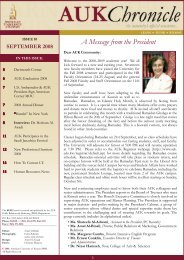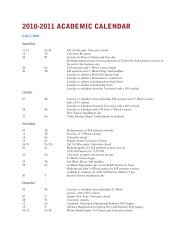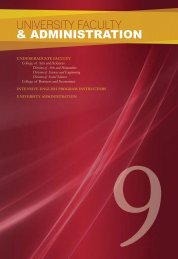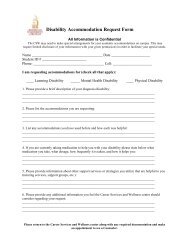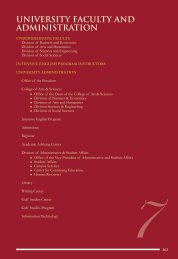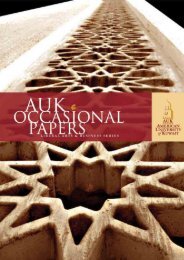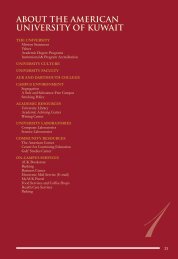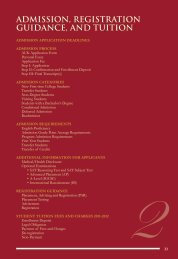Advising and OrientationOther important implications revolve around relationshipsestablished with faculty and staff through advising andorientation programs. Gaff (1997) and others foundthat freshmen year programs produce higher academicachievement, increased student satisfaction, and increasedstudent retention. In the educational discourse, however,it is the terms “advising” and “retention” that go handin-hand.In fact, Crockett (1978) referred to advising asthe “cornerstone” of student retention. Cuseo (2003)describes academic advising as one of the major academicand social domains of the college experience that affectsstudent decisions about staying or leaving. As Wyckoff(1999) states, “To establish a high degree of commitmentto the academic advising process, university and collegeadministrators must become cognizant not only of theeducational value of advising but the role advising playsin the retention of students” (p. 3).According to Habley (1981), “Academic Advising isthe only structured activity on the campus in which allstudents have the opportunity for one-to-one interactionwith a concerned representative of the university” (p.45). Tinto (1987) suggests that advising is the very coreof successful institutional efforts to educate and retainstudents. King (1993) revealed that inadequate academicadvising emerged as the strongest negative factor instudent retention, while a caring attitude of facultyand staff and high quality advising emerged among thestrongest positive factors. Gordon (1985) put it thisway, “If there is an active, involved, ongoing relationshipbetween students and faculty advisors, a faculty advisingsystem can be an important ingredient in the retentionprocess” (p. 127). In fact, advising has become soimportant to student retention efforts that advising centersare not uncommon in residence halls, advisors are beingcentrally integrated into learning communities, and crossdisciplinaryadvisory boards for advising are being set upon campuses throughout the United States and abroad.Financial IssuesAccording to Nutt (2003), financial concerns often affectstudent persistence, and it is vital that advisors build strongcollaborations with the finance department on campus.As Nutt explains, “advisors need to be able to understandthe policies and procedures that affect students financialissues as well as have a clear understanding of how to refereffectively” (Nutt, 2003. para. 4). The loss of studentsreturning to campus for another year usually results ingreater financial loss and a lower graduation rate for theinstitution, and might also affect the way that stakeholders,legislators, parents, and students view the institution.”(Lau, 2003, para 2). Student retention is also a concernin the United Kingdom where, according to Nash (1996),administrators of academic institutions now focus mostof their efforts on decreasing student attrition, since theability to retain students has become a critical factor inobtaining outside funding.<strong>AUK</strong> is an academic culture in which the perception existsthat “money is not an issue.” However, for many of ourbest and brightest, it is. According to Lau (2003), numerousstudies indicate that students are motivated to improvetheir grades and stay in school when they are recipientsof financial assistance, aid, and scholarships. And priorperformance, course commitment and motivation are keyfactors influencing retention, progression, and completionrates at the university (Abbott-Chapman et al, 1992). Atthe time in which student advising becomes ingrained inthe Divisions level at <strong>AUK</strong>, rather than in the advisingcenter, it is critical that faculty understand the scholarship,payment, and financial options and responsibilitiesavailable to students.ResultsThis study triangulated a meta-analytical approach to theliterature on college student retention with <strong>AUK</strong> studentsurveys and faculty interviews involving over 200 subjects.Numerous studies demonstrate that finance is the keyreason why students do not enter or withdraw from theirfull time and part time higher education courses. Althoughexit data at the selected university identified “financial” asthe primary reason that Spring 2006 admits chose not toenroll, further examination via <strong>AUK</strong> surveys of currentlyenrolled student indicates that poor faculty-studentrelations, lack of facilities, course load, and poor timemanagement skills are key considerations in determiningif a student will choose to continue at the university in theFall 2007 and beyond, or not. In addition, although bothhigh student involvement in academic life on campus andfaculty participation in campus programs and events areproven ways to retain students, current enrollees reported alack of sufficient academic and social activities on campus,a noticeable lack of faculty participation in campus events,and only a 60% overall student satisfaction rate with<strong>AUK</strong>. Perhaps most interestingly, academic and socialprogramming needs predominate the student retentionliterature, with academic programming needs often givenpriority. At <strong>AUK</strong>, however, social programming needsplayed a significantly and surprisingly larger role. In fact,15
16some respondents indicated that it is not uncommon at<strong>AUK</strong> for students to come to the university primarily forsocial engagement and stimulation rather than academicengagement and stimulation, partially explaining highabsenteeism in classes.RecommendationsIn visualizing recommendations, solutions and improvements,it was helpful to modify Richardson and Skinner’s (1991)model, which includes three phases of institutionaladaptation to diversity. The adaptation is summarized asfollows (based on Kleeman’s [1994] previous modification):Stage One is reactive and concentrates on studentrecruitment, financial aid, admissions, and scheduling. Itemphasizes reducing barriers to higher education. Manypeople, including faculty, are often unaware of Stage Onechanges taking place at their institutions. When they areaware, they frequently voice concerns over “quality.” InStage One, achievement and growth may conflict.Stage Two is critical, because it emphasizes outreach,transition, mentoring and advising, and the environment.In Stage Two, effort is directed to helping students changeso they may achieve their academic and personal goals.Stage Three is an adaptive effort designed to improvestudent’s achievement by changing the learning environmentthrough student assessment, learning assistance, curriculumcontent, and improved teaching practices.Arguably, <strong>AUK</strong>, as a young institution, is still in Stage One.In the next 2-5 years, <strong>AUK</strong> should be able to effectivelytransition into Stage Two or beyond.Recommendations for increasing student retention ratesand facilitating successful degree completion include thedevelopment of numerous practical and proven studentcenteredretention and effective learning strategies. Theyare as follows:(Note: First, recognition of newly established programs or initiativesis overdue. These include the recent hiring of a RetentionSpecialist and the new “PALS” peer tutoring program.) Otherrecommendations include1. A New University Student Orientation Program thatfocuses on students who are academically prepared, aswell as students who are academically underprepared(where most of the focus generally resides). Also, theestablishment of an Honors Program motivates academichigh achievers who have a greater capacity for learning.2. A University Retention Steering Committee. Thesehave met with great success elsewhere. According toNutt (2003), “these committees report to both the VicePresidents of Academic and Student Affairs, establishingthat campus-wide collaborations, with advising as thecentral focus, are necessary for establishing effectiveretention efforts (Nutt, 2003, para. 8).3. The Establishment of an Institutional Research (IR)Office. An IR office is desperately needed to examinetrends and make recommendations based on readilyavailable census data, student evaluations, and otherstatistical data. This research provides two key examplesfor this need.First, in Burgess and Samuels (1999) article on studentretention, they found that sequential course instructor statusseems to be a predictor of college student success. Forboth developmental and regular courses, college studentsthat take the first course in a sequence from a part-timeinstructor, and the second course in the sequence froma full-time instructor are underprepared for the secondcourse, less likely to complete the second course, andless likely to pass the second course with a “C” or better.The increasing trend in higher education is the widespreaduse of part-time instructors. According to Burgessand Samuels (1999), many part time instructors teachdevelopmental and remedial courses, especially in English,reading, and mathematics; therefore, the students in needof the most assistance are taught by those least involvedin the university. In addition, part-time faculty is oftenasked to teach a substantial load without the pay, benefits,and support facilities of full-time faculty. As Burgess andSamuels explain:“Maricopa’s part-time faculty conditions of employmentare characterized by the following: no tenure or job security,instant nonrenewal at the discretion of Department chairs(lack of due process), generally inadequate or nonexistentoffice space and facilities, and no remuneration for timespent on student mentoring and counseling. Can it be thatpart time instructors grade more easily and demand lessfrom the students in order to avoid student complaints,which could jeopardize their continued employment?”(para. 31).Second, Langbein and Snider (1999) found that whencompared to mid-rated courses, enrollment in consistentlypoorly rated classes significantly reduces the probability of
- Page 2 and 3: About AUK Occasional Papers:The AUK
- Page 4 and 5: higher education is distinguished b
- Page 6 and 7: The Impact of a Glass Ceilingon Wom
- Page 8 and 9: more women a chance to flourish in
- Page 10 and 11: consider other factors such as the
- Page 12 and 13: academically unprepared…you must
- Page 14 and 15: EmotionalSignificant variations in
- Page 18 and 19: etention. However, in addition, the
- Page 20 and 21: Hadi and Llabre (1998) assessed int
- Page 22 and 23: the event was encoded in parallel a
- Page 24 and 25: Public Health Impacts of Iraq’s 1
- Page 26 and 27: college work and have inadequate pr
- Page 28 and 29: memorization and repetition. This a
- Page 30 and 31: other in the pursuit of higher grad
- Page 32 and 33: for quality assurance, an organizat
- Page 34 and 35: RethinkingEntrepreneurship:Integrat
- Page 36 and 37: This type of training leads to enha
- Page 38 and 39: In short, Mount Allison students ha
- Page 40 and 41: Joplin, L. (1995). On defining expe
- Page 42 and 43: Figure 1. ExperientialEntrepreneurs
- Page 44 and 45: Kuwait - satellite television, cult
- Page 46 and 47: ReferencesAbt, V. & Seesholtz, M. (
- Page 48 and 49: interest in continuing to manipulat
- Page 50 and 51: Though corruption poses fundamental
- Page 52 and 53: A Cross-Cultural Modelof Innovation
- Page 54 and 55: were conceived as associations of c
- Page 56: others. In this case, confident pos
- Page 59 and 60: 58REFERENCESAmason, A. (1996) ‘Di
- Page 61 and 62: Shelton, C. and Darling, J. (2004)
- Page 63 and 64: 62• recycle natural resources use
- Page 65 and 66: 64Table Kuwait Fact Profile on Tran
- Page 67 and 68:
Table Transportation and Associated
- Page 69 and 70:
68• Third, each mode of transport
- Page 71 and 72:
70• Prepare a Bank Group transpor
- Page 73 and 74:
7219. Stratford,A. (1974). Airports
- Page 75 and 76:
74may be developed in a safe and or
- Page 77 and 78:
28. Tables - 1 Environmental Manage
- Page 79 and 80:
6) EnvironmentalAwarenessNo baselin
- Page 81 and 82:
80Iran, the US, and HighlyEnriched
- Page 83 and 84:
82since the 1951 nationalization of
- Page 85 and 86:
8450% of the population is astonish
- Page 87 and 88:
86The US also approved the Shah’s
- Page 89 and 90:
88George W. Bush’s State of the U
- Page 91 and 92:
90when Iran could not keep up with
- Page 93 and 94:
92rich states, the decrease of natu
- Page 95 and 96:
94indigenous training. Specifically
- Page 97 and 98:
96It is important to note that Russ
- Page 99 and 100:
Table 1: Nuclear Powered States and
- Page 101 and 102:
100Foucault, Michel. “What are th
- Page 103 and 104:
102Ramazani, Rouhollah K. “Iran
- Page 105 and 106:
104My SCORE, OurMATCH: CommunityPar
- Page 107 and 108:
106with a mate while he does mechan
- Page 109 and 110:
108dimensions of life including for
- Page 111 and 112:
correlated to the commitment and on
- Page 113 and 114:
REFERENCESBryce, J, Frigo, T, McKen
- Page 115 and 116:
GDP $21,300, GDP growth rate 6.8%,
- Page 117 and 118:
• Less than half of the people su
- Page 119 and 120:
118TABLE 4: # 1 Gulf Country in Eco
- Page 121 and 122:
120• More men than women indicate
- Page 123 and 124:
TABLE 8: Why? X GenderGENDERMALE FE
- Page 125 and 126:
TABLE 11: Success in improving Livi
- Page 127 and 128:
TABLE 14: Success in preserving Cul
- Page 129 and 130:
• Gender wise, more men felt that
- Page 131 and 132:
TABLE 18: How foreign workers are t
- Page 133 and 134:
• In terms of the preference of e
- Page 135 and 136:
TABLE 24: Should Oil be the Basis f
- Page 137 and 138:
F i gur e 18: S hould K uwa it J oi
- Page 139 and 140:
13811. What do you think about the
- Page 141 and 142:
140Conditions of Kuwaiti Dependence
- Page 143 and 144:
1422) if the alien has no means of
- Page 145 and 146:
144offered Mubarak recognition as a
- Page 147 and 148:
146labor regulations and enforcemen
- Page 149 and 150:
148intensifying suspicion and hosti
- Page 151 and 152:
150Commission on Freedom of the Pre
- Page 153 and 154:
Even the viceroy of India, Lord Cur
- Page 155:
Christine PiconeAustralian College



